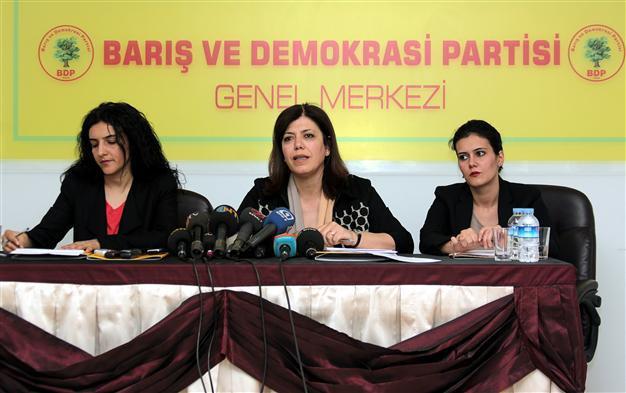BDP warns against repeat of Diyarbakır Prison impact
ANKARA - Hürriyet Daily News

"For Kurdish people, prisons are an issue of conscience and morality before everything else,” said BDP’s deputy co-chair Meral Danış Bektaş. AA photo
An executive of the Peace and Democracy Party (BDP) has drawn attention to poor conditions and human rights violations in prisons, recalling bitter memories concerning the infamous Diyarbakır Prison in the aftermath of the Sept.12, 1980 coup d’état.“Pains are fresh, memories and furies are so as well,” BDP’s deputy co-chair in charge of law and human rights issues, Meral Danış Beştaş, said on April 12, recalling the torture and ill-treatment exercised by officials, particularly in the years following the 1980 coup.
“For this reason, the first place to pay attention to political developments in our country is exactly the prisons,” Beştaş added, speaking at a press conference.
As the scene of brutal methods of torture against prisoners, Diyarbakır Prison is assumed to be a crucial factor in the escalation of the conflict regarding the Kurdish issue. Many cases in which prisoners chose to join the outlawed Kurdistan Workers’ Party (PKK) after being released, mainly due to the treatment received in prison, have come to light. The militants took up arms in 1984 to fight for Kurdish independence but later revised that goal to autonomy in southeastern Turkey.
Beştaş said that her party and human rights organizations had been receiving complaints regarding human right violations in prisons almost every day, adding: “This situation is neither understandable nor acceptable.”
While listing cases such as sexual and physical assault, limiting of books provided for prisoners, a groundless ban on communication, including with visitors; a statement released by the BDP’s Commission for Legal and Human Rights Affairs noted that at the moment there are 411 ill prisoners and the situation of 230 of those patients is serious.
“That’s why the government and the [justice] ministry should at once put an end to policies and practices in prisons which are not befitting human honor and being implemented by administrators’ who are under the authority of government,” the commission said in the statement.
“… Kurdish people’s prison memories are fresh. For Kurdish people, prisons are an issue of conscience and morality before everything else,” the commission said, underlining that the BDP would closely follow the issue in order to use every legal and political means.
Beştaş, meanwhile, voiced her party’s expectation for a thorough and serious investigation into the murder of three Kurdish female activists in Paris.
“In regards to foiling this provocation and sabotage, and for the process to continue healthily, the Paris murders should definitely be resolved,” Beştaş said, referring to the ongoing peace process aimed at ending the three-decade conflict between security forces and the PKK.
Sakine Cansız, one of the founding members of the PKK; Fidan Doğan, the Paris representative of the Brussels-based Kurdistan National Congress (KNK); and activist Leyla Söylemez were murdered on Jan. 9.
















